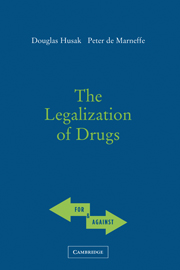Book contents
- Frontmatter
- Contents
- General Editor's Preface
- The Legalization of Drugs
- I For Drug Legalization
- 1 The Meaning of Drug Decriminalization
- 2 How Should We Evaluate Alternative Drug Policies?
- 3 Reasons to Criminalize Drug Use
- 4 Reasons to Decriminalize
- 5 Drug Legalization: Production and Sale
- II Against Drug Legalization
- Further Readings
- Index
3 - Reasons to Criminalize Drug Use
Published online by Cambridge University Press: 05 June 2012
- Frontmatter
- Contents
- General Editor's Preface
- The Legalization of Drugs
- I For Drug Legalization
- 1 The Meaning of Drug Decriminalization
- 2 How Should We Evaluate Alternative Drug Policies?
- 3 Reasons to Criminalize Drug Use
- 4 Reasons to Decriminalize
- 5 Drug Legalization: Production and Sale
- II Against Drug Legalization
- Further Readings
- Index
Summary
Each of the four rationales I will examine is designed to answer what I have called the fundamental question about our drug policy: Should recreational users of (some) drugs be punished? Should drug use be criminalized? Where should we look for possible answers to these questions – for alleged justifications of criminalization? Since there is no “official” rationale for our drug policy, the most sensible way to proceed is to examine those arguments that have actually been given by the most knowledgeable and thoughtful individuals who have spoken on its behalf. The most well-known defenders of our policy include William Bennett, the country's first and most influential “drug czar,” and James Q. Wilson, former chairman of the National Advisory Council for Drug Abuse Prevention and one of the most distinguished and widely respected criminologists in America today. In addition, I will make frequent reference to the publications of the Office of National Drug Control Policy (ONDCP) – the government office charged with establishing policies, priorities, and objectives for drug policy in the United States. Although the ONDCP has no authority to make law, it is perhaps the best source of an authoritative defense of the law.
Drugs and Health
Protecting our physical and mental health is one of the most important functions of the state. Might this objective justify the punishment of persons who use (some) drugs for recreational purposes? Does the need to protect our health and well-being provide the rationale for criminalization?
- Type
- Chapter
- Information
- The Legalization of Drugs , pp. 41 - 82Publisher: Cambridge University PressPrint publication year: 2005



